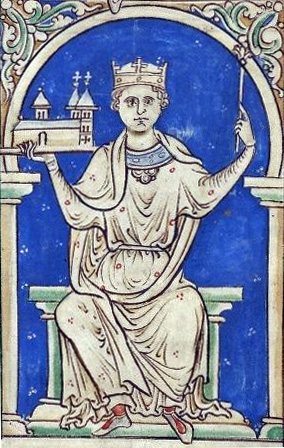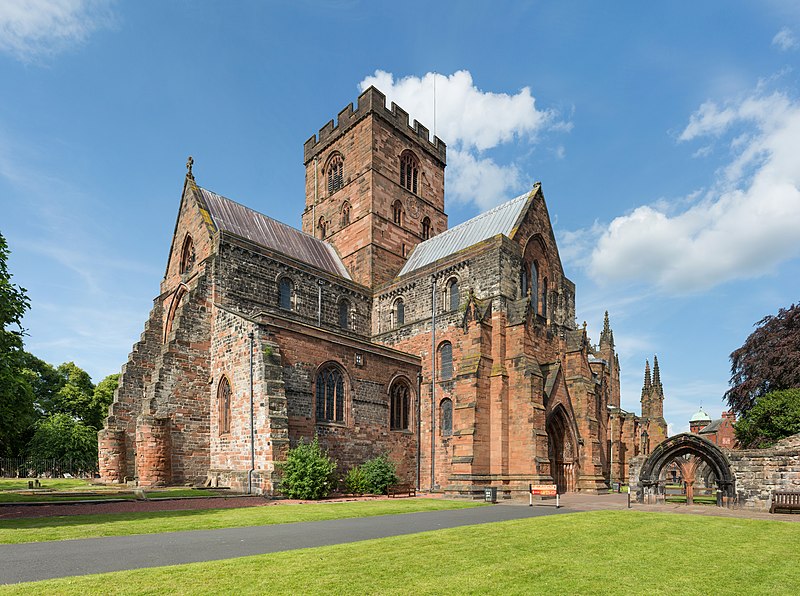 |
| Matilda's seal as Queen of England |
Dual Loyalties
Young Henry
was returned to the safety of Anjou while his uncle held the south west of
England and his father completed his conquest of Normandy which had been left
without effective leadership after Henry I’s death. Once Normandy was under
Angevin control troops could be ferried to Wareham. Rouen surrendered in 1144 and henceforth Geoffrey’s
domination of the duchy was virtually uncontested. Louis VII recognised Geoffrey as Duke of
Normandy in the same year[i].
The
potential loss of their Norman estates gave those of Stephen’s supporters, who
held lands both sides of the Channel, pause for thought; even Waleran of Beaumont;
‘Superior to all the rest of
the Norman nobles in castles, wealth and the number of his connections’[ii]
joined the
successful Geoffrey[iii].
Geoffrey for his part let it be known that as soon as Henry was old enough
Geoffrey would step aside and let his son rule as Duke of Normandy.
 |
| Walden Castle |
Another
former supporter of Stephen’s Geoffrey de Mandeville, was infuriated by the
enforced loss of his role as Constable of the Tower of London and the loss of his castles at Saffron Walden and Pleshey. His attempts to regain his former
possessions was made possible by the foment ensuing from the civil war.
Stephen was
now fighting on two fronts; against Geoffrey de Mandeville as well as Robert of
Gloucester. Geoffrey de Mandeville’s rebellion fell apart shortly after his
death in September 1144, when his son Ernulf was captured and banished. Stephen
could now turn his attention to Robert of Gloucester.
When Christ and His Saints Slept
Many of the
belligerents prayed for an end to the hostilities which were devastating the
countryside and made life a misery for those who worked the land.
‘The whole of this year was embittered by the horrors of war. There were
many castles throughout England, each defending their neighbourhood, but, more
properly speaking, laying it waste. The garrisons drove off from the fields,
both sheep and cattle, nor did they abstain either from churches or church-yards.
Seizing such of the country vavassours as were reputed to be possessed of
money, they compelled them, by extreme torture, to promise whatever they
thought fit. Plundering the houses of the wretched husbandmen, even to their
very beds, they cast them into prison; nor did they liberate them, but on their
giving every thing they possessed or could by any means scrape together, for
their release.’[iv]
Stephen’s lack
of control over the barons led to the building of many unlicensed castles[v]. His nobles did not want
to fight; the earls of Chester and Leicester went so far as to take out mutual
insurance policies[vi],
they were not the only ones.
One of
Robert’s senior commanders, Miles of Gloucester, had been killed in a hunting
accident on Christmas Eve 1143. This advantage to Stephen was offset by the
expiry of Henry of Winchester’s[vii] appointment as Papal
Legate in September 1143; much of his power over the clergy was lost.
Two Cousins
 |
| Stephen |
The two
sides were at a stalemate as Stephen leant less and less on his barons, who
drifted towards supporting the Angevins. Stephen now placed more reliance on
the professionals he placed in positions of power; William of Ypres, Richard de Lucy, William Martel and Gervase of Cornhill. Stephen hoped that the barons would
reconcile themselves to the loss of their estates in Normandy and support him
in the war.
In 1147
Henry decided to take action himself and the fourteen year old hired
mercenaries and, along with a group of companions, took sail for England where
his small force attempted to take the king’s strongholds at Cricklade and Purton. The inexperienced group were beaten
off; eventually Henry was forced to ask Stephen to give him the money to pay
off his mercenaries and return home; his mother not having provided the
wherewithal[viii].
Stephen’s
control over the country was precarious; he wanted his son Eustace crowned
during his own lifetime[ix]. But this required papal
consent and in 1145 a new pope, Eugenius III, had been elected. Eugenius’ mentor Bernard of Clairvaux had denounced Henry of Winchester as
.jpg) |
| Bernhard of Clairvaux |
‘The man who walks before
Satan, the son of perdition, the man who disrupts all rights and laws.’[x]
Eugenius
disputed Stephen’s right to interfere in episcopal appointments and refused
permission for Eustace’s crowning.
Dealings with the Church
Unlike
Stephen Matilda was more careful in her relations with the church. When Bishop Joscelin de Bohun demanded[xi] the return to church care
and control of Devizes castle previously held
by Roger of Salisbury[xii], Matilda made the effort
to placate de Bohun. In the summer of 1148 Matilda left England to return to
Normandy, travelling to Falaise to meet with him; she left the castle garrisoned by loyal
soldiers.
Matilda departed
the country knowing that Henry was poised to take her place in opposing
Stephen. She wrote to her son explaining that she did not want to oppose the
church and left managing the vexed question of Devizes to him.
The sixteen
year old arrived at Devizes at Easter 1149, where he was met by a number of his
supporters before dutifully returning the outlying properties to Bishop de
Bohun. Henry then explained that he needed to hold onto the castle until God
brought victory to his cause.
‘With the exception of the
castle of Devizes…and the service of the knights of that manor I retain in my
hand because of my great need, until God has shown me that I may give it back
to him.’[xiii]
 |
| Carlisle Cathedral |
By the end
of 1149 Henry had been knighted by his Great-Uncle David in a ceremony in
Carlisle attended by the Earl of Chester who finally came to terms with his old
rival. Miles of Gloucester’s son Roger was knighted at the same time. Henry Murdac, Abbot of Fountains Abbey was also present. Stephen had refused to accept his
nomination as Archbishop of York[xiv].
FitzEmpress
After
leaving Carlisle Henry made his way south, seized the town of Bridport and evaded all Stephen’s attempts to capture him, despite a pincer
movement between Stephen and Eustace. Father and son undertook a scorched earth
policy in the south west. Eustace attacked Henry at Devizes, almost breaking
beyond the outer defences.
Despite
Henry’s presence Stephen, in the north, and Eustace, based in Oxford, had the
upper hand and Henry’s advisers suggested that he return home and beg support
from his father. He was not to return to England until 1153. On Henry’s return
to Normandy, true to his word, Geoffrey handed over control of Normandy to his
eldest son. In England the two parties were content to lick their wounds and
refrain from attacking one another.
The
charismatic new duke was to pose a problem for Stephen; henceforth his opponent
was a forceful, vigorous young man of twenty, grandson of Stephen’s
predecessor. Stephen meanwhile was no longer able to count on the support of
the church; his brother Henry was out of favour in Rome[xv].
By the
summer of 1153 the war had dragged on for nearly fifteen years, a period
described at the time as being ‘When
Christ and his saints slept.’
Bibliography
The Feudal
Kingdom of England 1042-1216 – Frank Barlow, Pearson Education Ltd 1999
Stephen and
Matilda – Jim Bradbury, The History Press 2005
She Wolves –
Helen Castor, Faber and Faber 2010
Early
Medieval England – MT Clanchy, Folio Society 1997
The
Plantagenets – Dan Jones, William Collins 2013
King Stephen
– Edmund King, Yale University Press 2010
Doomsday to
Magna Carta – AL Poole, Oxford University Press 1987
At the Edge
of the World – Simon Schama, BBC 2002
Early
Medieval England – Christopher Tyerman, Stackpole Books 1996
Henry II –
WL Warren, Yale University Press 2000
[ii]
Stephen and Matilda - Bradbury
[iii]
Waleran never opposed Stephen directly after pledging allegiance to Geoffrey;
he escaped the difficulties of a divided allegiance by going on crusade in 1147
[iv]
http://www.gutenberg.org/files/50778/50778-h/50778-h.htm#BOOK_IF
nb this note of William of Malmesbury’s refers to 1140, but the sorry state of
the villeins then was as dire as it was now
[v]
By 1153 there were believed to be over 1,115 of these
[vi]
If they were forced to fight each other they would take no more than 20 knights
each and any captured property would be returned.
[viii]
Opinion is divided as to whether Matilda was being parsimonious or whether she
was hoping that Henry would return to the safety of Normandy
[ix]
A custom that had been practised by the kings of France to ensure an orderly
succession
[x]
She-Wolves - Castor
[xi]
With the backing of the pope
[xii]
De Bohun was Roger’s successor
[xiii]
King Stephen - King
[xiv]
The church revenues were being paid into the royal coffers
[xv]
And Henry of Winchester was at odds with Archbishop Theobald who resented his
being Papal Legate. Stephen needed to keep Theobald onside, as he would be
needed to crown Eustace
It's no surprise it was later called 'The Anarchy'
ReplyDelete